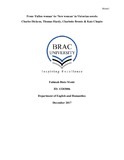From ‘Fallen woman’ to ‘New woman’ in victorian novels: Charles Dickens, Thomas Hardy, Charlotte Bronte & Kate Chopin

View/
Date
2017-12Publisher
BRAC UniversityAuthor
Monir, Fatimah BinteMetadata
Show full item recordAbstract
Pedagogical assumptions of feminism have made great strides over time and after passing through three waves have today reached a point where women can claim to have sovereign identities as members of a society independent of male support. Despite such progress, inherently patriarchal conventions are still the driving force behind the position of women in society. The Victorian age was the period of Queen Victoria from 22 June, 1837 till her death on 22 January, 1901. A series of changes took place in regards of social, political and moral aspects in this period. At the beginning of this period women’s right were very limited. They have no right to vote, right over wages and middle class women are expected to please their husbands, taking care of their children and managing household chores. They are treated as the product of pleasure by patriarchal society. This is the starter period of women’s movement against their oppression. In the last few years of this period prejudicial laws have been abolished, feminist ideas spread among the educated middle class women and women’s suffrage movement has acquired powerful direction.
The thesis will focus on two literary terms ‘fallen woman’ and ‘new woman’ with some selected Victorian novels which are Oliver Twist by Charles Dickens, Tess of the D’Urbervilles by Thomas Hardy, Jane Eyre by Charlotte Bronte and The Awakening by Kate Chopin. The objective of this thesis is to look some of the female characters of the selected novels in respect of the chosen terms guided by the theories of Mary Wollstonecraft and Virginia Woolf and to analyze the journey from ‘fallen woman’ to ‘new woman”.
Keywords
Fallen woman; New woman; Victorian novels; Charles Dickens; Thomas Hardy; Charlotte Bronte; Kate ChopinDescription
This thesis is submitted in partial fulfillment of the requirements for the degree of Bachelor of Arts in English, 2017.Department
Department of English and Humanities, BRAC UniversityType
Collections
- Thesis, B.A. (English) [624]
